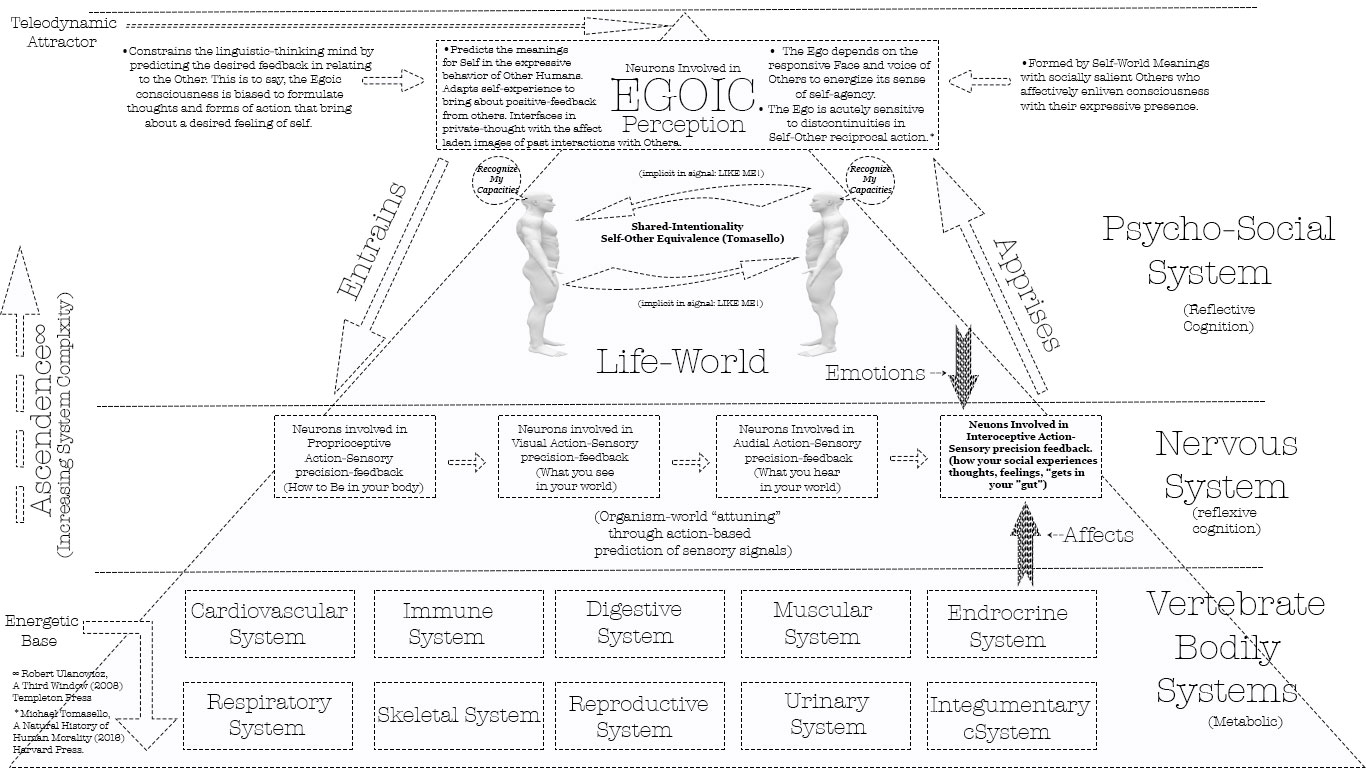It looks like you're using an Ad Blocker.
Please white-list or disable AboveTopSecret.com in your ad-blocking tool.
Thank you.
Some features of ATS will be disabled while you continue to use an ad-blocker.
4
share:

All of us live our lives in terms of how the environment structures us. We come in as no more than a being who has been potentiated by his mothers hormones (which represent her emotional states during pregnancy) and from there on out, we observe, and as we observe, we assimilate, so that our first moments of "self-agency" become more and more infused with the self-other dialect between affect and mind, or between what others express in their actions, and what those expressions ultimately express i.e. a motivation-expression "dialectic". In short, expressions should be understood as potentially dissociative, inasmuch as characteristic situations (social asymmetry in interactions) inevitably provoke species specific responses, and sometimes the responses we see aren't what we expect, more or less hiding the negative stimulus behind an adaptive idealization of "what the self should be". Idealizations are cognitive reactions assimilated from our observations of others. We don't think it up; it just comes into us and enchains our reasoning processes to cliché narratives which the culture we subscribe to takes as 'true'.
We live in a profoundly mentally ill culture, and as someone who more or less "sits it out", I am able to maintain a certain level-headedness precisely because interacting with other humans entails assimilation of self-other affective states. And what I see is downright horrifying. People wrongly assume that they are able to deal with apocalyptic scenarios. They exaggerate or - IDEALIZE - their relations. But facts are facts; very few people can tolerate reality when we are deprived of what makes our day to day lives materially satisfying. Consider, for instance, the necessity of clean drinking water; or a toilet; or toilet paper. All these amenities actually mediate a feeling state, and so are termed "affordances": they GIVE you something you would otherwise not have. Take these things away, and guess what? Your consciousness will be "chafing" - or become chafed, and irritated, by such impersonal things as an itchy asshole, dysentery, and a general feeling of dirtiness.
Here is the power of metaphor, and a profound example of the continuity between physical dirtiness and moral dirtiness. This thesis is easy and obvious; feelings at the physical level become "re-described" in terms of how we're feeling and how interpret what we feel in relation to Others. So if we're dirty, #ty, and what-not, those states tend to support a brutish attitude to the world around you - to yourself, to others, to reality.
Or, on the other hand, you will find yourself wanting to leave reality i.e. through detachment. Extreme situations of scarcity thus express polarized states of human awareness: a thuggish attitude which becomes more or less synonymous with nihilism and sadomasochism, and a world-weariness which dissociates its conscious mind more and more from the physical senses. These are extremes, and extremes which are supported by the detritus conditions of living.
More or less, then, how humans think is an emergent property of the emotional cultures were exposed to. Affects - or feeligns - are powerful sources of communication, and they more or less setup the context of how it is were going to think about something. Affect expresses a logical that surpasses the individual self, and isntead refers to community at large, expressed best, I think, by the psychologist Michael Tomasello's "Shared-intentionality".

The above chart tries to represent how humans respond in terms of the larger-level cultural habits of the group around them (for the purpose of shared-intentionallity); yet, within each consideration, or each interaction, each person really wants to recognized at a basic level in terms of the affects (needs) which are animating their present consciousness. This of course is an IDEAL. It is one of those ideals which civilization as a whole is moving towards; indeed, I hope my own understanding of the subject can help shed light on how it is we can change in this direction, and what that direction ultimaytely means.
For the most part, humans are not reasonable - but i think it is naive to think Humans have never been reasonable. If C.S. Peirce can be described as one of the most reasonable - logical - humans we know of, is it at all impossible that at some primitive, perhaps unrecorded past, that humans, without the neeed to "work" backwards (I think civilization has largely "overshot" what we think reality is) instead acheived a coherent representatino of reality for the simple reason that we never veered so off from it? By "veering off", I mean civilization itself. Lines don't actually exist, but are idealizations. Geometry is an idealization - one that underlies the building of buildings, roads, cities, agriculture, irrigation systems, etc. Do you think a dynamical system (a human) which interacts with the results of its actions wont come to superimpose the efficacy of its thinking in one modality (building) into another (relating to other humans and understanding self)? Obviously this is what happened. Something profoundly normal preceded human civilization which a caused a transformation in functioning such that we came to think in evermore incoherent ways. Reason - and the way one learns how to reason - vanished. The self became glorified, and the earlier knowledge of the protean nature of the self - of self being fundamentally a "point-counterpoint" dynamic, a crucial empirical knowledge which arises when the mind attunes to the world within it and around it - fell away. And from then - perhaps 12,000 years ago, civilization slowly began to arise, and consciousness slowly reshaped itself in terms of its proudly created objects.
This is another reason for why I think its important to consider the possibility that extant aboriginal societies might not be authentic representations of "man in his truest state". Some groups, such as the Aka, are an image of edenic behavior; while others (new guinea tribes) aren't. We must keep in mind, also, the fact of the conditions by which humans live: again, the world around us shapes our affect. Harsh living conditions produce harsh mentalities.
In any case, if the ground of our being is determined by early life events, isn't it obvious that our earliest joys and sufferings underlie the way our self-grows, and thus, what are self says is "good" and what it says is "bad"? I don't see how people who subscribe to a "moral relativism" can imagine that they will get away with this without being forced - by reality itself (it's own self, at root) to recognize the way the tragic beginnings of life directed the self to believe what it believed and act the way it acted.
Obviously, this has a sort of "grand-consciousness" sort of ring to it. Yet I actually think this is how reality work. It has rules only in the sense that the rules scaffold the eternal verities of nature, so that, in effect, all of reality is a symbolic expression of Gods "eternal verities", expressed outward as "nature". In fact, this phrase could just as meaningfully be expressed in the inverse: Nature expresses eternal truth, such that we realize our own Godliness".
The godliness, or the "you are as gods", is not the immature and naive trite of satanists. Pride - or personal pride at the expense of another - is a
poisonous delusion that conceals the fact that the other is really you: there is not "two", but a singularity - a singular continuum of being, and so,
it would be most of unwise to succumb to the delusion that you aren't, in fact, "your brother's keeper".
originally posted by: Astrocyte
Pride - or personal pride at the expense of another - is a poisonous delusion that conceals the fact that the other is really you: there is not "two", but a singularity - a singular continuum of being, and so, it would be most of unwise to succumb to the delusion that you aren't, in fact, "your brother's keeper".
Consider this:
The other is not you - there is no other. In fact there is no you either.
There is not two - no you, no me.
Just this.
There is no this doing that (no something doing something); there is only this being this.
I am not trying to be pedantic - but there is no you that is your brothers keeper - holding on to the idea of you is still misunderstanding the singularity.
Watch the videos and things may settle.
edit on 29-11-2017 by Itisnowagain because: (no reason given)
new topics
-
The Good News According to Jesus - Episode 1
Religion, Faith, And Theology: 1 hours ago -
HORRIBLE !! Russian Soldier Drinking Own Urine To Survive In Battle
World War Three: 3 hours ago -
Bobiverse
Fantasy & Science Fiction: 6 hours ago -
Florida man's trip overseas ends in shock over $143,000 T-Mobile phone bill
Social Issues and Civil Unrest: 6 hours ago -
Former Labour minister Frank Field dies aged 81
People: 9 hours ago -
SETI chief says US has no evidence for alien technology. 'And we never have'
Aliens and UFOs: 10 hours ago
top topics
-
President BIDEN Vows to Make Americans Pay More Federal Taxes in 2025 - Political Suicide.
2024 Elections: 15 hours ago, 18 flags -
Florida man's trip overseas ends in shock over $143,000 T-Mobile phone bill
Social Issues and Civil Unrest: 6 hours ago, 8 flags -
SETI chief says US has no evidence for alien technology. 'And we never have'
Aliens and UFOs: 10 hours ago, 7 flags -
Former Labour minister Frank Field dies aged 81
People: 9 hours ago, 4 flags -
Ode to Artemis
General Chit Chat: 16 hours ago, 3 flags -
This is our Story
General Entertainment: 13 hours ago, 3 flags -
Bobiverse
Fantasy & Science Fiction: 6 hours ago, 3 flags -
HORRIBLE !! Russian Soldier Drinking Own Urine To Survive In Battle
World War Three: 3 hours ago, 1 flags -
The Good News According to Jesus - Episode 1
Religion, Faith, And Theology: 1 hours ago, 0 flags
4
